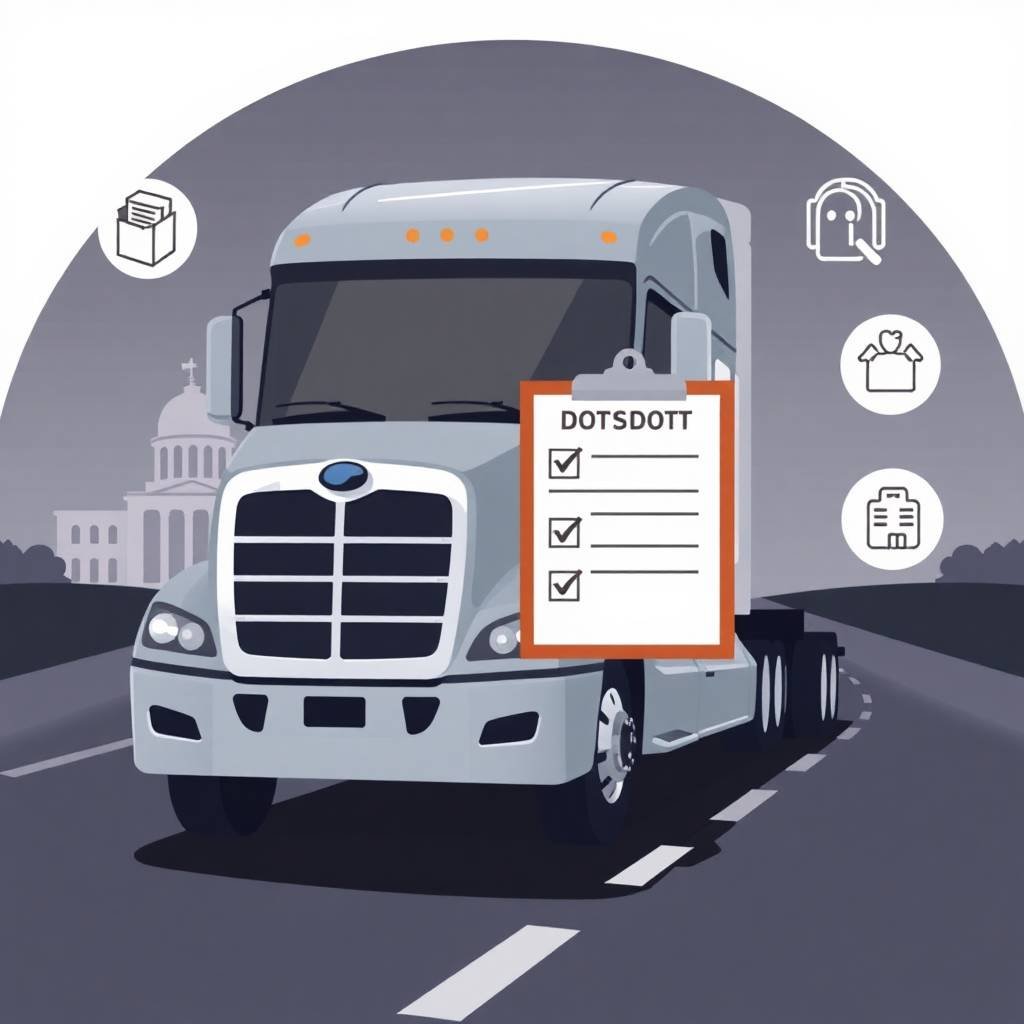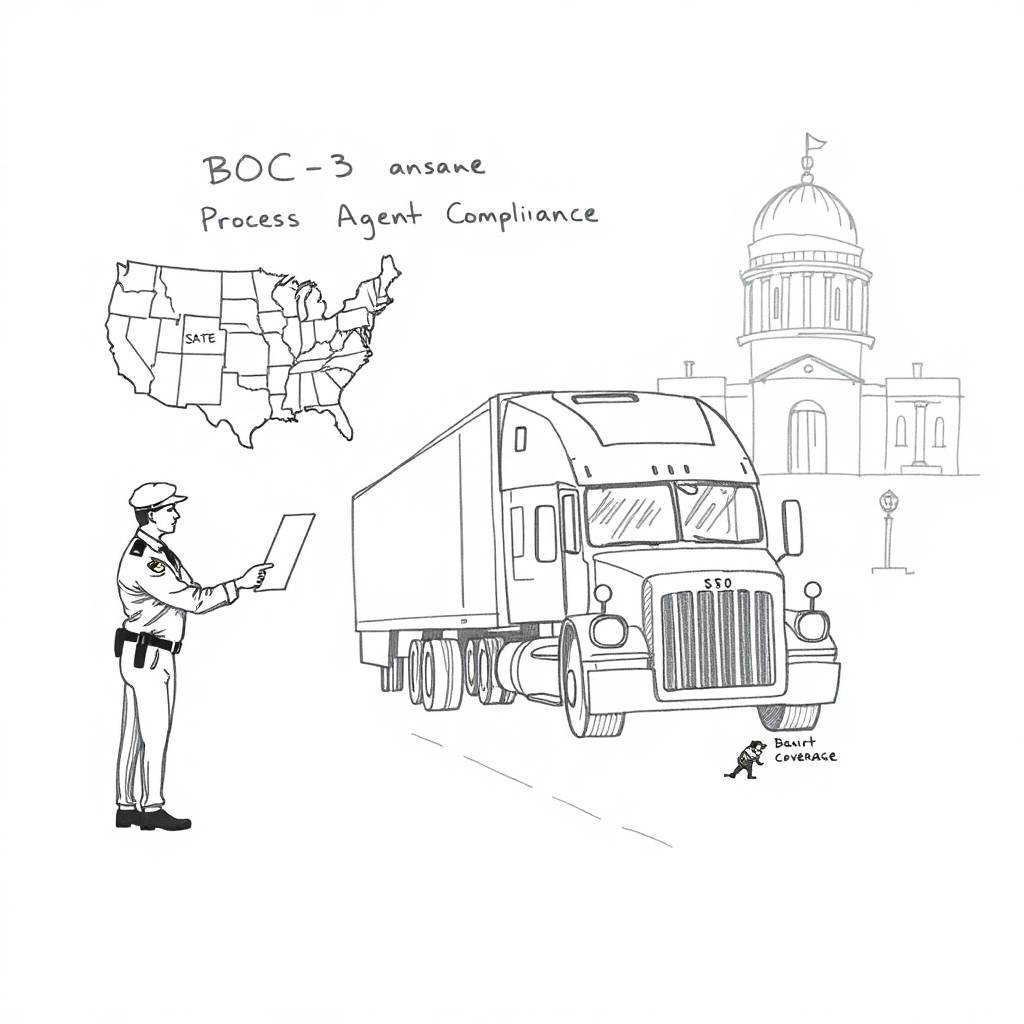1. Why BOC-3 Process Agent Compliance Is Non-Negotiable for FMCSA Registration
Navigating the regulatory landscape of the trucking industry can be overwhelming. However, one element that cannot be overlooked is BOC-3 Process Agent Compliance. Without it, your authority to operate legally under the Federal Motor Carrier Safety Administration (FMCSA) is at risk. Whether you’re a new entrant or an experienced carrier, understanding and maintaining BOC-3 compliance is essential to staying on the road.
What Is BOC-3 Process Agent Compliance?
BOC-3, or “Blanket of Coverage,” is a federal filing that designates a process agent in every U.S. state where a motor carrier operates. These agents accept legal documents on your behalf. BOC-3 Process Agent Compliance is required for securing operating authority with the FMCSA, as mandated on the official FMCSA website.
Filing a BOC-3 is not a one-time task. It must be accurate, current, and supported by a professional agent or service provider like ours at Truckers Compliance Hub. Without it, your USDOT or MC number will not be activated.
Why Is BOC-3 Compliance Crucial?
Failing to meet BOC-3 Process Agent Compliance requirements can delay or revoke your FMCSA registration. This affects your ability to haul freight, increases audit risk, and potentially leads to fines and out-of-service orders.
DOT audits can be particularly unforgiving. Prepare ahead with our DOT audit preparation service and get expert support to navigate complex regulations. Learn more about DOT audit preparation for 2025.
The Role of BOC-3 in Full FMCSA Compliance
BOC-3 Process Agent Compliance is only one aspect of FMCSA registration. Trucking companies must also meet other standards like maintaining DQ file requirements, adhering to drug and alcohol testing compliance, and tracking performance under the FMCSA Safety Measurement System.
Owner-operators can also benefit from dedicated services like DQ File Setup and Monitoring, UCR filing assistance, and drug and alcohol testing management.
Avoiding Common Mistakes in BOC-3 Filing
Many trucking companies face challenges due to outdated or incomplete filings. Check out our insights on common FMCSA compliance mistakes and how to avoid them. Ensuring BOC-3 Process Agent Compliance early on prevents unnecessary legal complications later.
Resources and Next Steps
Explore our comprehensive articles on FMCSA clearinghouse compliance, pre-employment DOT drug testing requirements, random DOT drug testing requirements, and driver drug and alcohol testing programs.
Need tailored guidance? Schedule your appointment with our compliance specialists today. You can also view our latest and previous posts for ongoing updates.
For industry-wide regulations, refer to the U.S. Department of Transportation and FMCSA websites.
Valuable Support Services
Explore how we help trucking companies and owner-operators maintain BOC-3 and FMCSA compliance with ease. You can also view our alternate owner-operator service page here.
Final Thoughts
BOC-3 Process Agent Compliance is not just a legal formality—it’s a core requirement that supports your authority to operate and shields your business from potential legal disruptions. With expert support and proactive preparation, you can ensure your trucking operation remains compliant and profitable.
For more information, review our Disclaimer, Privacy Policy, and Terms of Service.

2. Choosing the Wrong Process Agent: A Critical Mistake
For motor carriers navigating the complex regulations of the Federal Motor Carrier Safety Administration (FMCSA), BOC-3 Process Agent Compliance is a requirement that can’t be left to chance. Selecting the wrong process agent not only jeopardizes your FMCSA authority—it can also expose your company to significant legal risks and delays in operations.
What Is BOC-3 Process Agent Compliance?
BOC-3 Process Agent Compliance refers to the mandatory designation of process agents in each state where a carrier operates. These agents are responsible for receiving legal documents on your behalf. The filing must be submitted through a qualified provider before your authority is granted by the FMCSA.
Unfortunately, many carriers fail to vet their process agents, resulting in missed legal notifications, revoked authority, and expensive compliance errors. Learn more about FMCSA compliance mistakes and how to avoid them.
Why the Right Agent Matters
Choosing a reliable provider for your BOC-3 Process Agent Compliance ensures not only proper filing but timely communication and document handling. An unreliable or inactive agent can cause your business to fall out of compliance quickly—affecting everything from DQ file violations to DOT audit preparation.
To avoid these risks, explore professional support services such as IFTA/IRP & BOC-3 support and DOT audit preparation available through Truckers Compliance Hub.
How the Wrong Agent Impacts FMCSA Registration
BOC-3 Process Agent Compliance is directly tied to your FMCSA registration. Without proper filing, your authority cannot be granted, and operations must cease. Inaccuracies or delays can create a domino effect, leading to issues with your safety measurement system (SMS), driver qualification file requirements, or even drug and alcohol testing management (learn more here).
You can review official policies at transportation.gov for more guidance.
Mitigate Risk with Expert Services
Many trucking companies are unaware of how interconnected BOC-3 Process Agent Compliance is with other FMCSA requirements. From pre-employment drug testing to random testing protocols and driver programs, the wrong process agent can unravel your entire compliance structure.
Access essential resources such as our DOT compliance checklist, FMCSA compliance for trucking companies, and clearinghouse compliance guides.
Your Compliance Starts Here
To avoid the critical mistake of choosing the wrong process agent, schedule your appointment with one of our compliance professionals today.
Stay informed by browsing our latest and previous posts. We also offer services tailored for owner-operators and larger trucking companies, including DQ File Setup and Monitoring, UCR filing assistance, and drug and alcohol testing compliance.
Explore additional support for owner-operators.
Final Word on Choosing the Right Agent
Making the right choice for BOC-3 Process Agent Compliance isn’t optional—it’s essential. Avoid legal setbacks, ensure uninterrupted operations, and build a foundation for long-term compliance by working with trusted industry professionals.
Please review our Disclaimer, Privacy Policy, and Terms of Service for more information.

3. BOC-3 Process Agent Compliance Mistake #1: Not Updating Agent Information
In the world of trucking and freight operations, overlooking the need to update your process agent information is one of the most common and costly mistakes companies make. At the heart of BOC-3 Process Agent Compliance lies the requirement to designate and maintain an accurate list of agents for service of process. When this crucial information becomes outdated, carriers can face serious consequences, including revoked authority and DOT audit failures.
The Role of BOC-3 in FMCSA Compliance
The FMCSA mandates that every motor carrier operating in interstate commerce must file a BOC-3 form, designating process agents in each state. These agents are legally authorized to receive court documents and government notices on your behalf. If your designated agent information is outdated or incorrect, you are no longer in BOC-3 Process Agent Compliance, jeopardizing your operational standing.
A simple change—such as switching agents, moving office locations, or updating business status—requires immediate action. Failure to file updated agent information violates FMCSA compliance requirements for trucking companies and can create a ripple effect throughout your compliance status.
What Happens If You Don’t Update?
If your process agent fails to receive or forward official documents due to incorrect or outdated contact info, you risk missing critical legal notices. This noncompliance can lead to DQ file violations, safety measurement system (SMS) issues, and potential revocation of your authority. It also compromises your readiness for DOT audits.
To stay proactive, review your agent status using our DOT compliance checklist.
A Domino Effect on Broader Compliance
BOC-3 Process Agent Compliance isn’t an isolated obligation. It connects with multiple other requirements, including driver qualification file requirements, drug and alcohol testing compliance, pre-employment testing, and random DOT testing protocols.
Moreover, if you’re not compliant with FMCSA Clearinghouse regulations, updating your process agent is one more essential step in the broader landscape of DOT and FMCSA requirements.
Explore our drug and alcohol testing management services to ensure you’re aligned on all fronts.
How to Stay in Compliance
Partnering with experts in BOC-3 Process Agent Compliance gives your business a solid foundation. Our IFTA/IRP & BOC-3 support ensures your records are always current and correct. Whether you’re an owner-operator or managing a fleet, we offer comprehensive FMCSA compliance services for owner-operators and trucking companies.
Don’t wait until you’re facing a compliance issue—schedule your appointment with a compliance advisor today.
Take Action Now
Visit Truckers Compliance Hub to view additional resources and insights. Learn more about DOT audit preparation, DQ file setup, UCR filing, and our full range of compliance solutions.
Be sure to read our Disclaimer, Privacy Policy, and Terms of Service to understand our services and policies.
Staying current with BOC-3 Process Agent Compliance isn’t just smart—it’s non-negotiable for staying on the road legally.

4. Unfiled or Incorrect BOC-3 Forms Can Derail Your Authority
For motor carriers, freight brokers, and freight forwarders, maintaining BOC-3 Process Agent Compliance is not just a formality—it’s a legal requirement enforced by the Federal Motor Carrier Safety Administration (FMCSA). Unfortunately, many companies underestimate the impact that an unfiled or incorrectly filed BOC-3 form can have. The result? Delays, fines, and in many cases, complete revocation of operating authority.
Why the BOC-3 Matters So Much
A BOC-3 form designates a process agent in every state where a carrier operates, enabling the legal service of documents on your behalf. Without a correctly filed BOC-3, your business lacks a vital legal presence. That directly violates FMCSA compliance requirements for trucking companies, which can result in loss of operating authority.
Whether you’re an owner-operator or running a fleet, failing to meet BOC-3 Process Agent Compliance standards can trigger additional issues during DOT audits, cause DQ file violations, and even jeopardize your status within the FMCSA Safety Measurement System (SMS).
Common Mistakes That Break Compliance
The most frequent mistakes that lead to BOC-3 noncompliance include listing the wrong process agent, not updating agent information after a business change, or simply failing to file the form entirely. These issues are especially common among new carriers who may not fully understand the gravity of BOC-3 Process Agent Compliance.
Even seasoned operators fall short when managing this requirement alongside other mandates like drug and alcohol testing compliance, driver qualification file requirements, and pre-employment DOT drug testing.
The Domino Effect of Noncompliance
Letting your BOC-3 lapse or submitting it incorrectly sets off a cascade of problems. Not only do you risk missing critical legal notices, but you may also be flagged for further noncompliance across your operation. This includes failures in the FMCSA Clearinghouse, random drug testing, and overall audit preparation.
If you’re unsure whether your BOC-3 is correct or current, use our DOT compliance checklist to self-audit and act before your business suffers.
Get Help Before It’s Too Late
Achieving and maintaining BOC-3 Process Agent Compliance doesn’t have to be complicated. Our IFTA/IRP and BOC-3 support services help ensure everything is filed accurately and kept up to date. For owner-operators and fleets alike, we offer tailored compliance services that cover DOT audit preparation, DQ file setup and monitoring, drug and alcohol program management, and UCR filing assistance.
To avoid the risk of losing your authority, schedule a free compliance consultation and let us help protect your business.
Stay Informed and Compliant
Visit Truckers Compliance Hub for the latest industry posts and tips to improve your operations. Learn how to avoid FMCSA compliance mistakes, keep your driver drug and alcohol testing program in check, and stay audit-ready.
For more in-depth resources, check out our guides for FMCSA compliance help for trucking companies and owner-operators.
Before making any compliance decisions, be sure to review our Disclaimer, Privacy Policy, and Terms of Service.

5. Lack of Multi-State Representation Can Lead to Legal Gaps
In the complex regulatory landscape of the transportation industry, maintaining BOC-3 Process Agent Compliance is not just a legal formality—it’s a fundamental requirement for operating legally across state lines. The Federal Motor Carrier Safety Administration (FMCSA) mandates that all motor carriers, brokers, and freight forwarders designate a BOC-3 process agent in each state they operate in. A failure to do so can result in legal vulnerabilities, missed notices, and even operational shutdowns.
The Importance of Nationwide Coverage
BOC-3 Process Agent Compliance ensures that transportation companies have a legal representative in every U.S. state to receive court documents and government notices. Without adequate multi-state representation, companies risk missing critical legal correspondences. This can lead to fines, penalties, and FMCSA enforcement actions. For more information on federal transportation regulations, visit the U.S. Department of Transportation and the FMCSA website.
If you’re unsure whether your current representation meets the FMCSA requirements, consider using our DOT Audit Preparation services to identify potential compliance gaps.
Legal Gaps Can Trigger FMCSA Violations
Companies with insufficient BOC-3 representation may unknowingly fall out of compliance with other regulatory obligations. These violations can include DQ file violations, drug and alcohol testing compliance failures, and incomplete driver qualification file requirements.
Our DQ File Setup and Monitoring service ensures your driver qualification files remain audit-ready.
Compliance Is an Ongoing Commitment
Achieving BOC-3 Process Agent Compliance is not a one-time task—it requires ongoing management and alignment with evolving FMCSA regulations. Our DOT Compliance Checklist and FMCSA Compliance Requirements for Trucking Companies resources provide helpful guidance for continuous improvement.
Moreover, many companies fail to recognize the intersection between BOC-3 compliance and other crucial programs such as random DOT drug testing, pre-employment DOT drug testing, and driver drug and alcohol programs. Our Drug and Alcohol Testing Management service can help you stay aligned with FMCSA requirements.
Avoid Common Compliance Mistakes
One of the most common pitfalls is assuming that a single BOC-3 agent can cover all jurisdictions. This leads to gaps in representation, undermining BOC-3 Process Agent Compliance. Learn more about how to avoid these errors by reviewing our article on FMCSA Compliance Mistakes.
Need help ensuring your compliance infrastructure is solid? Check out our FMCSA Compliance Services for Owner Operators and IFTA, IRP & BOC-3 Support offerings.
Schedule a Consultation
If you’re uncertain about your BOC-3 Process Agent Compliance, now is the time to take action. Schedule your appointment today for a personalized consultation.
Stay Informed and Compliant
Explore our blog to view the latest and previous posts on FMCSA regulations, including insights on the FMCSA Clearinghouse and upcoming changes in the Safety Measurement System (SMS) 2025.
For tailored solutions, check our offerings for FMCSA compliance help for trucking companies and owner-operator services.
For more details on your rights and how we manage your data, please review our Disclaimer, Privacy Policy, and Terms of Service. Maintaining BOC-3 Process Agent Compliance is more than a regulatory checkbox—it’s your legal lifeline across state lines.

6. BOC-3 Process Agent Compliance Overlooked During Company Changes
In the transportation industry, regulatory compliance is an ongoing obligation that must evolve alongside any changes in company structure or operations. One critical area that often gets overlooked is BOC-3 Process Agent Compliance. Whether you’re relocating your business, changing ownership, or modifying your operational authority, failing to update your BOC-3 filing can expose your company to significant legal and financial risks.
Understanding BOC-3 Process Agent Compliance
BOC-3 Process Agent Compliance refers to the federal requirement that motor carriers, freight brokers, and freight forwarders appoint a process agent in every state they operate. These agents serve as legal representatives to receive court papers and official notices. The Federal Motor Carrier Safety Administration (FMCSA) requires this designation for interstate authority approval. You can learn more at the FMCSA website and the U.S. Department of Transportation.
When businesses undergo changes—such as name updates, relocations, or ownership transitions—they often forget to verify or update their BOC-3 Process Agent Compliance, assuming previous filings remain valid. This oversight can lead to noncompliance and jeopardize your operating authority.
Impact of Company Changes on Compliance
Changes in company structure may affect your compliance standing with the FMCSA in more ways than one. Without updated BOC-3 Process Agent Compliance, you may miss crucial legal notices, resulting in delayed responses to claims or fines. You may also face penalties during a DOT audit or encounter issues related to your driver qualification files.
Our DQ File Setup and Monitoring service can help ensure your files are current and aligned with any company changes.
How Compliance Intersects with Other FMCSA Mandates
BOC-3 Process Agent Compliance is closely connected to several other regulatory requirements, including DQ file violations, drug and alcohol testing compliance, and the FMCSA Clearinghouse. Many companies fail to recognize these intersections, which increases the risk of FMCSA compliance mistakes.
We offer Drug and Alcohol Testing Management and UCR Filing Assistance to support comprehensive compliance strategies.
Stay Proactive with Compliance
Being proactive in maintaining BOC-3 Process Agent Compliance is essential, especially when operational changes occur. Utilize our DOT Compliance Checklist and explore helpful tools like the FMCSA Safety Measurement System (SMS) 2025 update to stay ahead.
Our IFTA, IRP & BOC-3 Support service ensures your filings are accurate and timely, even during transitions.
Schedule Your Compliance Review
Avoid letting critical compliance areas fall through the cracks. Schedule your appointment today for a comprehensive compliance consultation tailored to your company’s current structure and future plans.
Additional Resources for Long-Term Compliance
For continued guidance, review our detailed guides on FMCSA compliance for trucking companies and services for owner-operators. Stay informed by reading our latest posts or checking out compliance essentials like pre-employment DOT drug testing and random DOT drug testing requirements.
To understand how we handle your information and responsibilities, please review our Disclaimer, Privacy Policy, and Terms of Service.
Staying current with BOC-3 Process Agent Compliance isn’t optional—it’s a legal necessity. Make sure your compliance strategy evolves with your business.

7. How Third-Party Filing Services May Risk Your BOC-3 Accuracy
In the trucking and freight brokerage industry, maintaining BOC-3 Process Agent Compliance is a legal requirement and a critical operational responsibility. However, many carriers and brokers unknowingly place their compliance status at risk by relying on unreliable or unqualified third-party filing services. While outsourcing certain filings may seem convenient, the accuracy of your BOC-3 Process Agent Compliance should never be compromised.
What Is BOC-3 Process Agent Compliance?
BOC-3 Process Agent Compliance refers to the FMCSA mandate requiring all interstate motor carriers, freight brokers, and freight forwarders to designate a legal process agent in each state where they operate. These agents receive legal documents and official notices on your behalf. Inaccuracies or outdated filings can result in missed legal notifications, fines, and even authority revocation. For official guidelines, refer to the FMCSA or U.S. Department of Transportation.
The Dangers of Using Unverified Third-Party Filing Services
Many third-party services promise fast and affordable BOC-3 filings. However, some fail to ensure comprehensive BOC-3 Process Agent Compliance, submitting incomplete forms or omitting states where you need representation. Others may list agents who are not legally authorized or responsive—putting your authority and legal defense at risk.
Worse, some filing agencies bundle services without properly aligning them with FMCSA regulations, increasing the likelihood of FMCSA compliance mistakes. Such errors can trigger penalties during an FMCSA audit or lead to violations for driver qualification files and DQ file violations.
The Importance of Working With Experts
Accurate BOC-3 Process Agent Compliance requires industry expertise, legal understanding, and proper oversight. At Truckers Compliance Hub, we ensure your filings are not only accurate but aligned with all your regulatory obligations. From DQ File Setup and Monitoring to UCR Filing Assistance, we provide comprehensive support.
Our IFTA, IRP & BOC-3 Support service ensures full-state coverage with verified process agents, helping you avoid legal gaps and maintain active authority.
Interconnected Compliance Areas
BOC-3 Process Agent Compliance is closely tied to other FMCSA programs. For example, noncompliance may affect your ability to pass audits or maintain proper drug and alcohol testing compliance. This includes both pre-employment and random DOT drug testing requirements.
We also offer Drug and Alcohol Testing Management and guidance for setting up a compliant driver drug and alcohol program. Additionally, our FMCSA Clearinghouse Compliance resources help you stay aligned with ongoing requirements.
Avoid Costly Mistakes—Act Now
Don’t let third-party errors jeopardize your operations. Schedule a compliance review today to verify your BOC-3 Process Agent Compliance and ensure your filings are accurate and up to date.
For a broader understanding of your responsibilities, explore our FMCSA Compliance Requirements for Trucking Companies, DOT Compliance Checklist, and Safety Measurement System SMS 2025 update.
To stay informed, check our latest posts, or explore our tailored offerings for owner-operators and trucking companies.
Before working with any third-party provider, be sure to review our Disclaimer, Privacy Policy, and Terms of Service.
BOC-3 Process Agent Compliance is too important to leave to chance—partner with professionals who understand your business and the law.

8. Failing to Understand the Role of a Process Agent in Legal Proceedings
Understanding BOC-3 Process Agent Compliance is vital for any trucking company or freight broker operating across state lines. Yet, many motor carriers overlook the critical role process agents play in legal proceedings, leaving themselves vulnerable to compliance failures and missed legal notices. Without proper attention to BOC-3 Process Agent Compliance, your authority could be revoked, and your business could face serious legal consequences.
What Is a Process Agent?
A process agent is a designated representative authorized to receive legal documents, such as court summons and official notifications, on behalf of a transportation company in each state where they operate. The Federal Motor Carrier Safety Administration (FMCSA) mandates that all interstate carriers file a BOC-3 (Designation of Process Agents) to be in compliance. To better understand FMCSA requirements, visit the official FMCSA website or U.S. Department of Transportation.
Why BOC-3 Process Agent Compliance Matters
BOC-3 Process Agent Compliance is more than a formality—it’s a legal safeguard. Failing to have the proper process agents listed or updated can lead to missed legal communications and default judgments in lawsuits. The consequences of such an oversight often show up during audits or through FMCSA compliance mistakes. Without proper documentation and agent designations, your company could lose operating authority or face penalties.
To mitigate this risk, a comprehensive DOT compliance checklist and support from compliance professionals is critical. Truckers Compliance Hub provides expert IFTA, IRP, and BOC-3 support that ensures your process agents are properly designated and legally compliant.
Common Mistakes and Their Consequences
Failing to understand the role of a process agent often leads to outdated or inaccurate BOC-3 Process Agent Compliance filings. Some carriers mistakenly assume their filings are permanent, unaware that any company changes—such as business structure updates or address changes—require an updated BOC-3 filing.
Other related compliance issues, such as DQ file violations and driver qualification file requirements, can also arise during FMCSA audits. Our DQ file setup and monitoring services ensure your documentation stays aligned with federal standards.
Integrated Compliance Strategy
Maintaining BOC-3 Process Agent Compliance must be part of a broader strategy. For example, drug and alcohol testing regulations—like pre-employment DOT drug testing requirements and random DOT drug testing—are all part of a robust compliance framework.
Truckers Compliance Hub offers full-service support, including DOT audit preparation, drug and alcohol testing management, and UCR filing assistance to help carriers stay ahead of regulatory challenges.
Take Action Today
Don’t wait for a legal complication or FMCSA audit to realize the importance of BOC-3 Process Agent Compliance. Schedule your consultation to review your current status and receive expert guidance on updating your process agent filings.
For more insights, visit our main blog and explore specific posts like FMCSA Clearinghouse Compliance, drug and alcohol testing compliance, and FMCSA safety measurement system SMS 2025.
We also offer tailored services for different business types, including compliance services for owner-operators and compliance help for trucking companies.
Before engaging with our services, be sure to read our Disclaimer, Privacy Policy, and Terms of Service. Let Truckers Compliance Hub help you stay legally protected through proactive BOC-3 Process Agent Compliance management.

9. BOC-3 Process Agent Compliance and DOT Audits: What You Must Know
BOC-3 Process Agent Compliance is more than just a regulatory requirement—it’s a foundational element of your company’s legal and operational integrity. As a motor carrier, broker, or freight forwarder under FMCSA regulation, failing to maintain accurate and up-to-date BOC-3 Process Agent Compliance could place your operating authority at risk, especially during a DOT audit.
This article outlines why BOC-3 filings matter, how they’re reviewed in audits, and how to avoid costly compliance mistakes.
The Link Between BOC-3 Process Agent Compliance and DOT Audits
The BOC-3 (Designation of Process Agents) form designates a legal representative (or process agent) in each state where a carrier operates. This ensures that if legal documents need to be served, they’re properly received and responded to. During a DOT audit, inspectors often verify whether a company has maintained valid and accurate BOC-3 Process Agent Compliance along with other critical safety and operational documentation.
For an in-depth breakdown of what’s checked during audits, refer to our complete DOT compliance checklist.
Why Compliance Often Falls Through the Cracks
Too many carriers assume that once they file their BOC-3, they’re done for good. But if your company undergoes structural changes (e.g., name changes, address updates, or ownership transfers), your BOC-3 must be updated accordingly.
A failure to maintain accurate BOC-3 Process Agent Compliance is considered one of the more common FMCSA compliance mistakes that can trigger red flags during audits.
Broader FMCSA Audit Considerations
Your BOC-3 Process Agent Compliance works hand-in-hand with other key compliance areas, including:
- Drug and alcohol testing compliance
- Driver qualification file requirements
- DQ file violations
- Clearinghouse regulations
For help managing these responsibilities, check out our services like DQ file setup and monitoring and drug and alcohol testing management.
Staying Prepared and Avoiding Penalties
A DOT audit can happen with little warning, especially if your company scores high in the FMCSA Safety Measurement System (SMS). Your best defense is a proactive compliance strategy that includes accurate BOC-3 Process Agent Compliance, drug testing protocols like random DOT drug testing, and required filings like UCR.
For companies needing end-to-end support, our IFTA, IRP, and BOC-3 support ensures that every critical filing is handled with precision.
Schedule a Compliance Review Today
Don’t wait until you’re in the middle of a DOT audit to find out you have missing or incorrect paperwork. Schedule a consultation with one of our experts today to review your BOC-3 Process Agent Compliance and ensure your filings are up-to-date and audit-ready.
To stay informed, visit our main blog for updates and insights. You can also learn more about our full range of FMCSA compliance services for trucking companies and owner-operators.
Transparency and Support You Can Trust
Before using our services, please review our Disclaimer, Privacy Policy, and Terms of Service. For more official regulatory information, visit FMCSA.gov and the U.S. Department of Transportation.
Maintaining BOC-3 Process Agent Compliance is not optional—it’s essential for staying operational, legal, and audit-ready. Let Truckers Compliance Hub help you stay on track.

10. Avoiding Common BOC-3 Compliance Myths That Can Cost You
When it comes to FMCSA requirements, BOC-3 Process Agent Compliance is often misunderstood. Unfortunately, believing the wrong information can result in severe consequences—ranging from delayed authority to unexpected DOT violations. To help trucking companies, brokers, and owner-operators avoid costly missteps, we’re breaking down the most common myths surrounding BOC-3 Process Agent Compliance, and what you should know to stay compliant.
Myth 1: “You Only File BOC-3 Once—Then You’re Done”
One of the most dangerous misconceptions is that BOC-3 Process Agent Compliance is a one-time task. In reality, anytime your company’s name, address, or legal structure changes, you must update your BOC-3. Failing to do so can trigger issues during DOT audits or affect your UCR filings.
To ensure ongoing accuracy, consider leveraging BOC-3 support services designed to maintain filings on your behalf.
Myth 2: “Any Process Agent Will Do”
Not all process agents are created equal. Some third-party services lack knowledge of FMCSA protocols, which could lead to non-compliance. BOC-3 Process Agent Compliance requires designating a reliable agent in every state where you operate. Selecting an unqualified agent may jeopardize your authority and open the door to legal vulnerabilities.
For better insight into choosing the right support, review our post on FMCSA compliance mistakes.
Myth 3: “BOC-3 Compliance Isn’t Checked During DOT Audits”
This is false. During a compliance review or audit, FMCSA investigators routinely verify your BOC-3 Process Agent Compliance status alongside other core areas like driver qualification files, drug and alcohol testing compliance, and DQ file violations. Lack of proper documentation can lead to fines or a suspension of authority.
Need help preparing? Visit our DOT audit preparation services.
Myth 4: “BOC-3 Has Nothing to Do With Drug Testing or Clearinghouse Rules”
While BOC-3 Process Agent Compliance is legally distinct, it’s part of the larger compliance landscape. Trucking companies that understand the interconnectedness of Clearinghouse compliance, random drug testing, and pre-employment testing are far more likely to pass audits and avoid violations.
To streamline your compliance, explore our drug and alcohol testing management services.
Stay Ahead of FMCSA and DOT Requirements
BOC-3 Process Agent Compliance plays a foundational role in meeting overall FMCSA compliance requirements. It also directly impacts your standing in the FMCSA Safety Measurement System.
Want to ensure your compliance strategy is sound? Schedule a personalized consultation today.
For more helpful content, explore our latest updates at Truckers Compliance Hub and see how we help owner-operators and fleets maintain compliance with confidence.
Compliance You Can Trust
Before working with us, we encourage you to read our Disclaimer, Privacy Policy, and Terms of Service. For official information, visit FMCSA.gov or the U.S. Department of Transportation.
Avoid costly assumptions. Prioritize your BOC-3 Process Agent Compliance to stay on the road, avoid delays, and pass every inspection.

What is BOC-3 Process Agent Compliance and why is it required by the FMCSA?

BOC-3 Process Agent Compliance is a federal requirement mandated by the FMCSA (Federal Motor Carrier Safety Administration) for all motor carriers, brokers, and freight forwarders. The BOC-3 form designates legal process agents in every state where your business operates, ensuring you’re reachable for legal documents. Non-compliance can result in delays or revocation of your authority. For help with your filing, visit our IFTA, IRP & BOC-3 Support page.
What are the most common BOC-3 Process Agent Compliance mistakes carriers make?

The most frequent mistakes include using an unqualified agent, failing to update address or business changes, and submitting incorrect or incomplete forms. These errors can delay your FMCSA authority approval or lead to legal complications. Our team at Truckers Compliance Hub offers support to ensure your BOC-3 Process Agent Compliance is filed accurately and maintained correctly over time.
Can I file the BOC-3 form myself to stay compliant?

While it’s technically possible to file a BOC-3 yourself, the FMCSA requires that it be submitted by a process agent or processing company. Errors in self-filing can lead to non-compliance. Professional assistance is highly recommended for accurate BOC-3 Process Agent Compliance. If you’re unsure how to proceed, our DOT Audit Preparation services can guide you through the proper documentation process.
How often should I review my BOC-3 Process Agent Compliance status?

You should review your BOC-3 Process Agent Compliance status at least annually or immediately after any changes to your business structure or address. Keeping your filings updated is critical to avoiding costly compliance penalties. For full monitoring and setup, explore our DQ File Setup and Monitoring services to ensure your records—including BOC-3—are always current.
Does BOC-3 Process Agent Compliance affect other DOT compliance areas?
Yes, BOC-3 Process Agent Compliance is closely tied to overall DOT compliance. Failure in BOC-3 accuracy can trigger issues during DOT audits or when filing Unified Carrier Registration (UCR). Staying compliant in one area helps ensure you’re compliant across the board. We offer comprehensive UCR Filing Assistance as part of our broader compliance services to keep your operations legally secure.
Igor Iturriaga is a transportation compliance expert and founder of Dynamic 305 Miami LLC. He helps owner-operators and fleets stay FMCSA-compliant and audit-ready. https://www.linkedin.com/in/igor-iturriaga-64503217/
